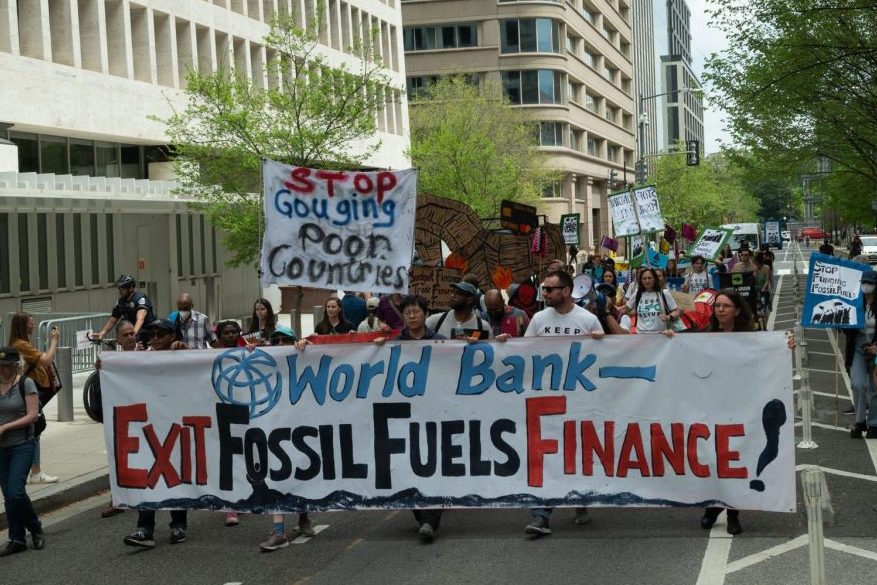- 22.06.2023
- Ecological justice
- Array
- New principles published on Monday [1] will be used by the World Bank Group and other Multilateral Development Banks (MDBs) to guide future investments;
- MDBs criticised for failing to consult publicly on the principles which have been publicly disclosed less than two weeks ahead of a 1 July deadline for implementation;
- Campaigners hoped the principles would see MDBs stop funding fossil fuels;
- But a continued allowance for oil and gas investments, loopholes for coal financing, and lack of accountability measures, see them described as a “doomsday plan”;
- Recourse calls on the World Bank Group, Asian Infrastructure Investment Bank (AIIB) and other MDBs to immediately stop funding fossil fuels, tighten loopholes on financial intermediary investments, and rapidly shift financing to sustainable renewable energy.
Climate and human rights campaigners have condemned new guidance on how the World Bank Group, Asian Infrastructure Investment Bank (AIIB) and other Multilateral Development Banks (MDBs) will align their investments with the Paris Agreement on Climate Change.
The long-awaited Joint MDB Methodological Principles for Assessment of Paris Agreement Alignment [1] provides rules for how the publicly-funded MDBs will mitigate the climate impacts of future investments. With $422 billion of public finance invested in fossil fuels 2016-2021 [2], campaigners hoped this would mean the end of MDB financing of fossil fuels.
Recourse have been highly critical of the new guidance, saying it only does the “bare minimum” by excluding coal power investments, and fails to prevent future support for gas power or captive coal power for industrial uses (e.g. smelting). As studies suggest that the 1.5oC temperature goal of the Paris Agreement could be breached by 2027 [3], Recourse says that all MDBs should urgently stop funding fossil fuels.
Fran Witt, anti-gas campaigner at Recourse, said: “This is not a Paris alignment approach, this is a doomsday plan that will accelerate the world to more than 1.5oC of global warming. It is a total myth that we can stay below 1.5oC while continuing to fund gas power. True Paris alignment needs to mean a rapid shift in finance from fossil fuels to sustainable renewable energy projects.”
Campaigners highlighted how the failure to exclude gas power from future investments will undermine MDB commitments to uphold women’s rights and economic empowerment.
Fiza Qureshi, from Indus Consortium in Pakistan, said: “Women and communities in Pakistan have suffered enough from climate change-induced droughts and floods. We do not need climate-wrecking fossil gas in Paris Alignment. What we need is a just transition to sustainable renewable energy.”
Recourse criticised the late disclosure of the principles, published less than two weeks before they are meant to apply to most MDB portfolios, and a failure to commit to public consultation and review of the guidance. Recourse also highlighted that investments via financial intermediaries could still be made in high risk projects, including coal, if intermediaries could demonstrate a “credible pathway” to mitigating climate risk [4] – but pointed out that there was no clarity on what such a credible pathway might look like.
Kate Geary, co-director at Recourse, said: “It has taken the MDBs eight years to come up with a plan for business as usual. A public and transparent process for producing this guidance would have helped to avoid loopholes and improve accountability measures for affected communities, but instead we have a set of late, weak guidelines that won’t catalyse the necessary shift in financing from fossil fuels to clean energy.”
“The guidance on indirect investments gives the green light for MDBs to keep channelling public funds to fossil fuels via commercial banks and private equity funds. We are at a time when urgent and rapid action to reduce carbon emissions is absolutely vital – yet the vague counterparty approach described here suggests that fossil fuel financers will still receive public funding. This will not prevent previous harms – such as those caused by IFC-backed coal projects in the Philippines, India, and Indonesia – from reoccurring in the future.”
Ian Rivera, National Coordinator of Philippine Movement for Climate Justice, said: “While we laud any attempts to end coal power, climate-vulnerable communities wanted the MDBs to go further by excluding all financing of climate-busting projects, including oil and fossil gas. This will help keep the rise in global temperatures below 1.5oC and ensure the survival of vulnerable communities already suffering from these climate impacts.”
ENDS
Notes
[1] Joint MDB Methodological Principles for Assessment of Paris Agreement Alignment, June 2023: https://www.worldbank.org/en/publication/paris-alignment/joint-mdb-paris-alignment-approach.
[2] Oil Change International, ‘Commitment to end international finance for fossil fuels is shifting billions, but key countries breaking promises missing in action’, 15 March 2023: https://priceofoil.org/2023/03/15/new-report-commitment-to-end-international-finance-for-fossil-fuels-is-shifting-billions-but-key-countries-breaking-promises-missing-in-action/#:~:text=Oil%20Change%20International%27s%20Public%20Finance,173%20billion%20for%20clean%20energy.
[3] ‘World likely to breach 1.5C climate threshold by 2027, scientists warn’, Guardian, May 2023: https://www.theguardian.com/environment/2023/may/17/global-heating-climate-crisis-record-temperatures-wmo-research.
[4] Joint MDB Methodological Principles for Assessment of Paris Agreement Alignment of New operations – Intermediated financing, June 2023: https://documents1.worldbank.org/curated/en/099153206162328669/pdf/IDU0c77fadd6076d30433709a4b07b34a68508b2.pdf.
